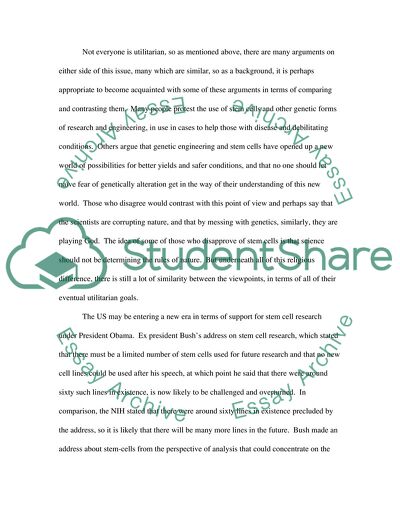
- Home
- Free Samples
- Premium Essays
- Editing Services
- Extra Tools
- Essay Writing Help
- About Us
- Studentshare
- Subjects
- Miscellaneous
- ENGLISH ESSAY COMPARE AND CONTRAST ESSAY
ENGLISH COMPARE AND CONTRAST - Essay Example

- Subject: Miscellaneous
- Type: Essay
- Level: Ph.D.
- Pages: 4 (1000 words)
- Downloads: 0
- Author: xleuschke
Extract of sample "ENGLISH COMPARE AND CONTRAST"
dividual’s placental cells or other cells and then can used to make replacement cells if there is a problem or disease that comes up during the individual’s life. “Therapeutic cloning, in theory, offers patients lab-grown replacement cells that wont be rejected by their immune system.” (Travis, 2002). This process is set to solve problematic issues in medical and genetics-based sciences currently because no cells match the individual in terms of rejection or acceptance of the cells like the individual’s own cloned cells.
From a utilitarian perspective, in which the greater good of the most amount of people in society is prized, stem cells seem rather like there should not be any debate about their effectiveness or widespread use. However, there are two sides of this issue to compare. On the one side, there are people who support stem cells. These people have viewpoints with many similarities. On the other, in contrast, there are those who oppose. There are essential similarities on both sides, however, because both have the good of society in mind.
Not everyone is utilitarian, so as mentioned above, there are many arguments on either side of this issue, many which are similar, so as a background, it is perhaps appropriate to become acquainted with some of these arguments in terms of comparing and contrasting them. Many people protest the use of stem cells and other genetic forms of research and engineering, in use in cases to help those with disease and debilitating conditions. Others argue that genetic engineering and stem cells have opened up a new world of possibilities for better yields and safer conditions, and that no one should let naïve fear of genetically alteration get in the way of their understanding of this new world.
Those who disagree would contrast with this point of view and perhaps say that the scientists are corrupting nature, and that by messing with genetics, similarly, they are playing God. The idea of some of those who
...Download file to see next pages Read MoreCHECK THESE SAMPLES OF ENGLISH ESSAY COMPARE AND CONTRAST ESSAY
The Yellow Wallpaper and the Mark on the Wall
Blakes Songs of Innocence and Songs of Experience with Walt Whitmans Leaves of Grass
How to Write College Admission Essay
My writing Learning Experience in this class -where I started from the beginning of the class to now
Compare and contrast
Promoting Web-content Services: The Master Essay UK Organization
Comparison and Contrast of Politics and the English Language by Orwell and Mother Tongue by Tan A
Teaching English for Academic Purposes

- TERMS & CONDITIONS
- PRIVACY POLICY
- COOKIES POLICY